When it comes to choosing the perfect surface for your kitchen or bathroom, stone countertops have long been a favorite option due to their natural beauty, durability, and timeless appeal. With various types of stone countertops available, from granite to marble, selecting the right one can greatly enhance the aesthetics and functionality of your space. Whether you’re remodeling your kitchen or designing a new bathroom, understanding the types of stone countertops and their unique benefits is essential to making an informed decision. In this guide, we’ll explore the different types of stone countertops, their advantages, and tips on how to choose the best one for your home.
Why Choose Stone Countertops?
Stone countertops are a popular choice for homeowners looking for a durable, elegant, and low-maintenance option for their kitchens and bathrooms. One of the main reasons people opt for stone countertops is their long-lasting durability. Stones like granite, marble, and quartz are resistant to wear and tear, making them ideal for high-traffic areas like kitchens where surfaces are often subjected to heavy use. Unlike other materials, stone countertops are resistant to scratching, staining, and heat, ensuring they maintain their beauty for many years.
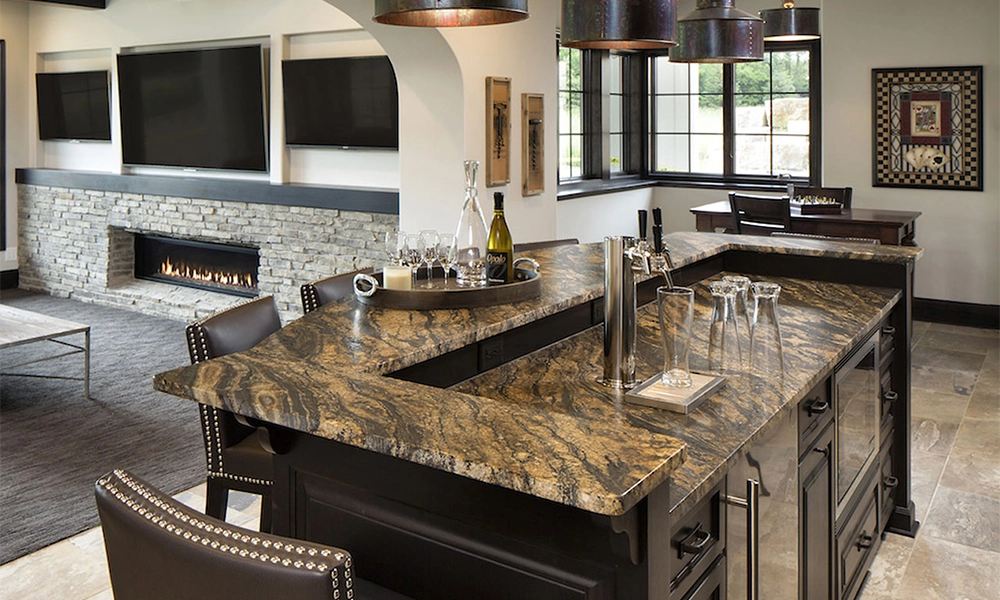
Another significant benefit of stone countertops is their natural aesthetic appeal. Each stone is unique, offering a variety of colors, textures, and patterns that can complement any design style, from modern to traditional. Whether you’re drawn to the classic elegance of marble or the bold, natural patterns of granite, stone countertops bring a timeless beauty that other materials simply can’t match. The natural look of stone creates a luxurious atmosphere, making it a great investment for homeowners who want to add value to their property.
In addition to beauty and durability, stone countertops are easy to maintain. While some types of stone, like marble, require more upkeep (e.g., sealing), many stones like granite and quartz are relatively low-maintenance. Simply wiping down the surface with mild soap and water is enough to keep it looking pristine. For those seeking a long-lasting, low-maintenance option, stone countertops are a perfect choice.
Finally, stone countertops can increase the value of your home. The premium quality and sophistication of stone surfaces are highly attractive to potential buyers. Investing in a stone countertop not only elevates the aesthetic of your home but also makes it more appealing in the real estate market.
For all these reasons, choosing a stone countertop can be a smart, practical decision that enhances both the functionality and visual appeal of your home.
Types of Stone Countertops
There are several types of stone countertops to choose from, each offering unique benefits. Granite countertops are highly durable and come in a variety of colors, making them a popular choice for modern kitchens. Marble countertops provide a luxurious, classic look, perfect for elegant spaces. Limestone offers a more rustic aesthetic, while travertine countertops are known for their unique texture and warmth. At Hunterpavers, we offer a wide range of premium stone countertop options to fit any style and budget, ensuring you find the perfect match for your kitchen or bathroom design.
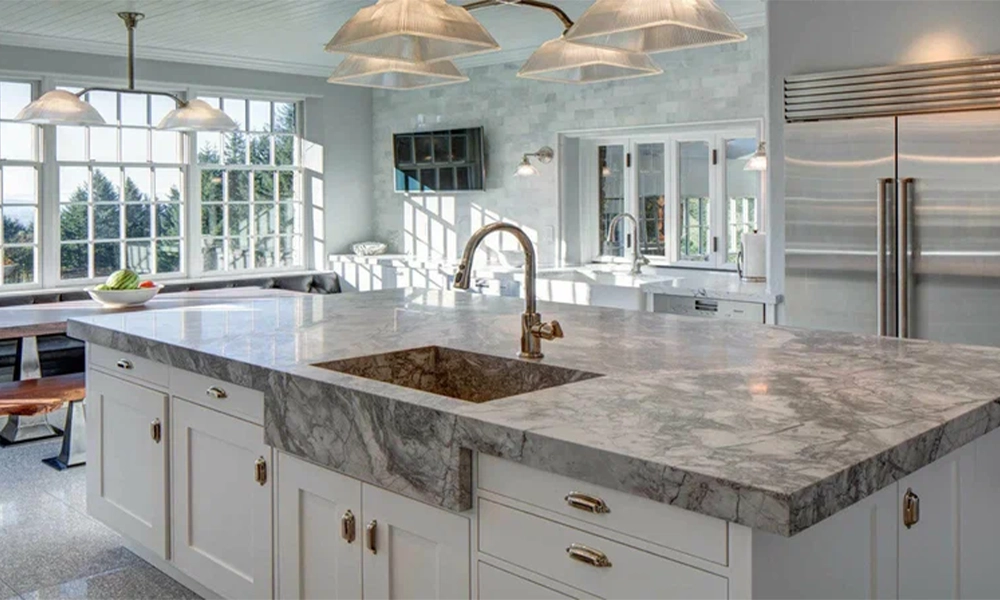
Granite Countertops
Granite countertops are one of the most popular choices for both kitchens and bathrooms due to their exceptional durability and aesthetic appeal. This natural stone is heat, scratch, and stain-resistant, making it ideal for high-traffic areas. Granite is also available in a wide range of colors and patterns, ensuring that it can complement almost any interior design style. While granite requires sealing to maintain its resistance to stains, it is relatively low-maintenance compared to other materials. Overall, granite countertops provide a luxurious yet functional solution for homeowners seeking a lasting, beautiful surface.
Marble Countertops
Known for their luxurious and timeless beauty, marble countertops are a favorite among those who want to add sophistication to their space. The distinctive veining and unique color patterns make each marble slab one-of-a-kind. Marble is naturally heat-resistant, which makes it a great option for bakers who need a cool surface to work with. However, marble is more porous than granite, which means it can stain and scratch more easily. Regular sealing is necessary to keep it looking pristine. Despite these considerations, marble countertops continue to be a top choice for homeowners seeking elegance and timeless charm.
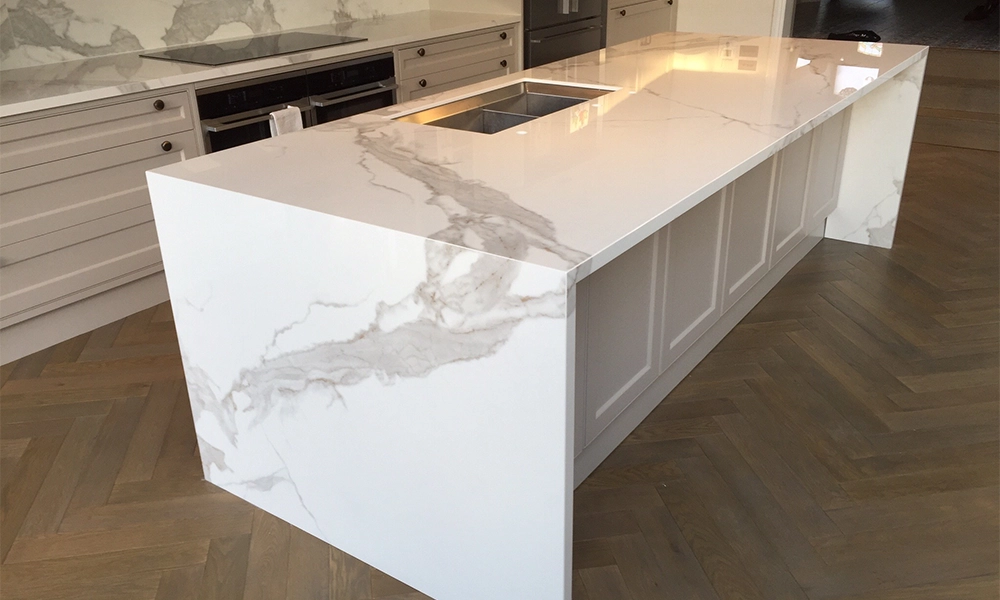
Limestone Countertops
Limestone countertops are known for their natural, earthy appearance and are often chosen for their rustic and warm charm. This sedimentary rock is softer than granite or marble, making it easier to work with. While limestone can provide a beautiful, organic look to your space, it is more susceptible to scratches, stains, and etching due to its porosity.
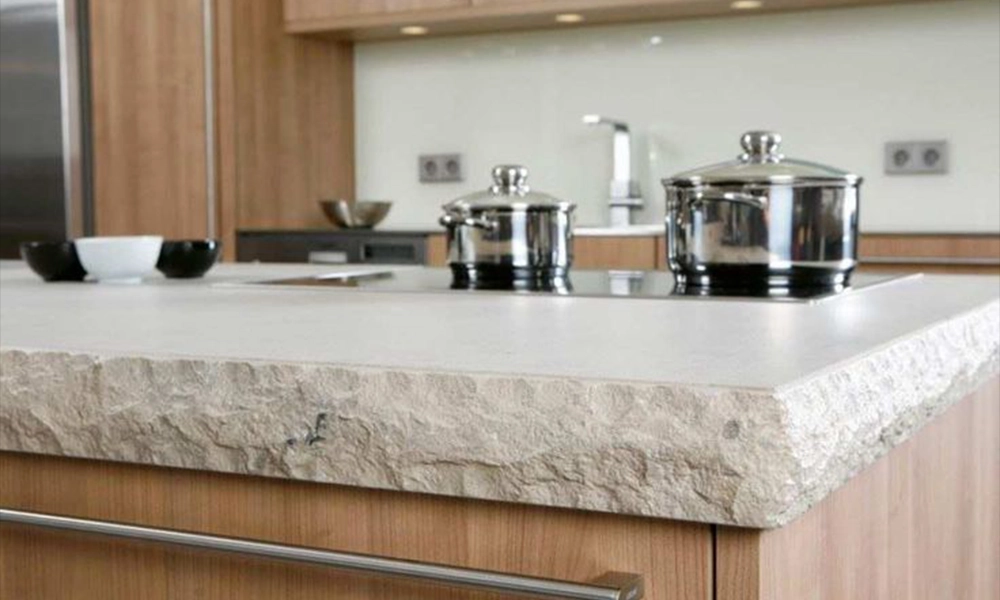
To prevent damage, regular sealing is essential. Limestone works best in low-traffic areas or for those who appreciate its unique texture and muted tones. It’s ideal for rustic or Mediterranean-style kitchens and bathrooms, offering a serene, understated beauty.
Travertine Countertops
Travertine countertops are characterized by their distinctive texture and warm, earthy colors. This natural stone is available in shades of beige, brown, and gold, and it has a unique porous structure that adds character to any space. Travertine is relatively soft compared to granite, which makes it more prone to scratches and damage.
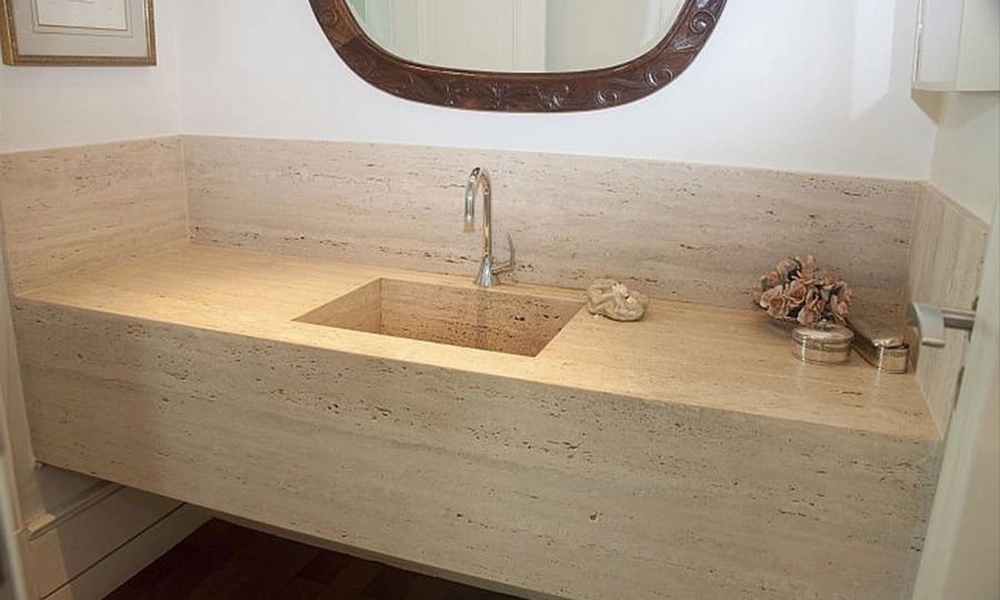
However, it is heat-resistant and offers a rustic, timeless look. Travertine countertops require regular sealing to prevent staining and wear, but with proper care, they can last for many years. This material is perfect for homeowners seeking a natural, Mediterranean-style look in their kitchen or bathroom.
Comparison of Popular Stone Countertops
Feature | Granite Countertops | Marble Countertops | Limestone Countertops | Travertine Countertops |
| Durability | Highly durable, heat, scratch, and stain-resistant | Luxurious but more prone to scratching and staining | Softer, more prone to scratches and stains | Soft, porous, susceptible to scratches |
| Maintenance | Low maintenance, requires sealing | Requires regular sealing, more maintenance | Needs regular sealing, more upkeep | Needs sealing, regular maintenance required |
| Aesthetic Appeal | Wide range of colors and patterns, modern appeal | Timeless beauty with unique veining, classic look | Earthy, rustic, natural appearance | Warm, earthy tones, rustic texture |
| Cost | Medium to high cost | High cost due to luxury appeal | Lower to medium cost | Medium cost |
| Best For | High-traffic kitchens & bathrooms | Elegant, luxury spaces | Rustic or Mediterranean designs | Mediterranean or rustic kitchens |
| Heat Resistance | High | High, ideal for bakers | Moderate | High |
| Scratch Resistance | High | Low to moderate | Low | Low |
How to Choose the Best Stone Countertop for Your Kitchen or Bathroom?
Choosing the best stone countertop for your kitchen or bathroom can be a daunting task, especially with the wide variety of types of stone countertops available today. Each material offers its own unique set of advantages and considerations, so it’s important to understand your specific needs and preferences before making a decision. Here are key factors to consider when selecting the perfect stone countertop for your space:
Durability and Maintenance
One of the first things to consider when evaluating the types of stone countertops is the level of durability you require. If you have a busy kitchen or a high-traffic bathroom, you’ll want a countertop material that can withstand everyday use. Granite countertops are well-known for their strength and durability, offering scratch, heat, and stain resistance. On the other hand, marble countertops, while elegant, are more susceptible to staining and scratching, making them less ideal for high-traffic areas.
When it comes to maintenance, some stone surfaces require more care than others. Quartz countertops, for example, are engineered and non-porous, making them easy to maintain and resistant to stains. Materials like limestone and travertine are more porous and require regular sealing to avoid damage from spills or scratches.
Aesthetic and Style
The aesthetic of your stone countertop should complement the overall style of your kitchen or bathroom. Granite countertops come in a variety of colors and patterns, from bold, dramatic designs to subtle, neutral tones, giving you plenty of options to match your decor. If you’re aiming for a luxurious and timeless appeal, marble countertops can add sophistication and elegance with their unique veining and rich color variations.
For a more rustic or Mediterranean-inspired look, limestone and travertine countertops offer warm, earthy tones that give your space an organic, natural feel. Consider how the countertop’s appearance will blend with your cabinetry, flooring, and backsplash to create a cohesive design.
Budget
Your budget will also play a significant role in the selection process. While granite countertops are a popular choice, they tend to be more expensive due to their durability and natural beauty. Marble, especially high-quality varieties, can also be costly due to its luxurious appeal. If you’re working with a more modest budget, limestone and travertine countertops can provide an affordable, attractive alternative, though they may require more maintenance.
Functionality and Use
Finally, consider how the countertop will be used. If you do a lot of cooking and need a surface that can handle heat and heavy use, granite countertops are an excellent choice due to their exceptional durability. For those who prefer a smooth, cool surface for baking, marble countertops are ideal, though they do require extra care to avoid damage.
By carefully considering the types of stone countertops and their features, you can find the perfect material that balances aesthetics, functionality, and budget for your kitchen or bathroom. Make sure to evaluate your needs in terms of durability, maintenance, style, and cost to make an informed decision that will provide long-lasting beauty and value to your home.
Tips for Caring for Stone Countertops
Proper care and maintenance are essential to keep your stone countertops looking pristine and functioning well for years. Each type of stone requires specific cleaning and care, but there are some general guidelines that apply to all stone surfaces. Here are some helpful tips for maintaining the beauty and longevity of your stone countertops:
Clean Regularly with Mild Solutions
One of the most important aspects of caring for stone countertops is regular cleaning. For most types of stone, it’s best to use a mild dish soap mixed with warm water for daily cleaning. Avoid harsh chemicals, abrasive cleaners, or acidic substances like vinegar, lemon juice, or bleach, as these can damage the stone’s surface. A soft cloth or sponge should be used to wipe down the surface to prevent scratching.
Seal Your Countertops
Many natural stone countertops, like granite, marble, and limestone, are porous, which means they can absorb liquids and stain more easily. To protect your investment, it’s essential to seal your countertops regularly. The frequency of sealing will depend on the type of stone. For example, granite countertops may only need sealing once a year, while marble or limestone may require more frequent attention. Sealing helps create a protective layer that reduces the likelihood of stains and damage.
Wipe Up Spills Immediately
Stone countertops can be vulnerable to staining, particularly marble and limestone, which are more porous than other stones. To avoid permanent stains, it’s crucial to wipe up spills immediately. Acidic substances like wine, coffee, and citrus juices can etch or stain the surface if left on for too long. If a spill occurs, blot it up with a paper towel or soft cloth, and clean the area with a mild soap solution.
Use Cutting Boards and Trivets
While granite countertops are quite durable, they can still be damaged by excessive force. To avoid scratches, always use a cutting board when chopping or slicing foods. Similarly, hot pots, pans, and baking dishes should never be placed directly on the countertop, as even heat-resistant stones like granite can suffer from thermal shock, leading to cracks or discoloration. Use trivets or hot pads to protect your stone countertops from heat damage.
Avoid Heavy Abrasive Scrubbing
When cleaning, avoid using rough sponges or abrasive scrubbers on your stone countertops. These can scratch the surface, dull the finish, and compromise the protective seal. Instead, opt for a soft microfiber cloth or sponge to clean the surface. If you encounter tough stains, use a stone-specific cleaner designed for the type of countertop you have, as it will be gentle yet effective.
Repair Small Damage Promptly
If your countertop develops minor chips or scratches, it’s important to address them promptly. For granite and quartz countertops, there are specific repair kits available that can help fill in small chips or cracks. For other types of stone like marble or travertine, it’s recommended to consult a professional for repair. Don’t ignore small damage, as it can worsen over time and affect the countertop’s appearance.
Use a Daily Cleaner Designed for Stone
In addition to regular cleaning, using a stone-specific cleaner once a week or as needed can help maintain the finish and shine of your countertops. These cleaners are specially formulated to be gentle on the stone while removing dirt, grime, and oils without damaging the surface or compromising the seal.
Protect Against Scratching and Staining
If you are concerned about your countertop’s surface being damaged, consider using protective mats or placemats on areas of the countertop where food or beverages are prepared most frequently. This added layer of protection can prevent minor scratches and reduce the risk of stains.
By following these simple tips, you can maintain the beauty, durability, and longevity of your stone countertops, whether you have granite, marble, limestone, or any other natural stone. Regular cleaning, sealing, and careful use will ensure your stone surfaces continue to shine for years to come.
Conclusion
Choosing the right stone countertop for your kitchen or bathroom can significantly enhance the beauty and functionality of your space. With a wide variety of options available, including granite, marble, limestone, and travertine, each type of stone offers distinct advantages depending on your needs, style preferences, and budget. By considering factors like durability, maintenance, aesthetics, and cost, you can select a countertop that perfectly fits your lifestyle.
Remember, proper care and maintenance are key to preserving the beauty and longevity of your stone countertops. Regular cleaning, sealing, and prompt attention to spills and scratches will ensure that your investment continues to look pristine for years to come. Whether you’re drawn to the timeless elegance of marble or the sturdy practicality of granite, the right stone countertop can elevate your home and provide lasting value.
Ultimately, choosing the perfect stone countertop is about balancing style, function, and care. With the right choice and proper maintenance, your stone countertops will not only add beauty to your space but also stand the test of time.
